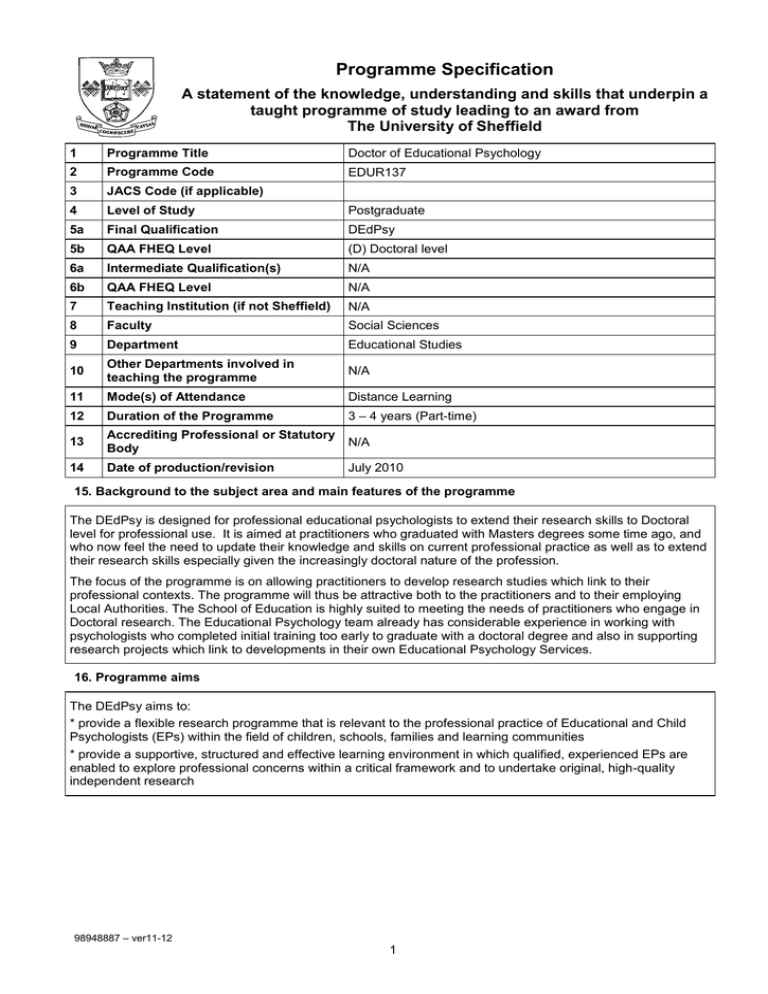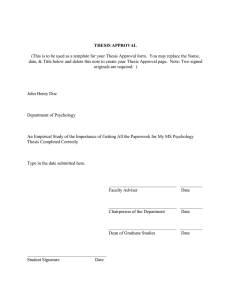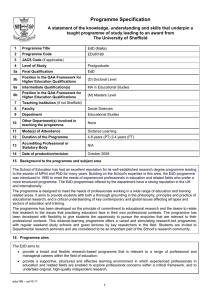Programme Specification
advertisement

Programme Specification A statement of the knowledge, understanding and skills that underpin a taught programme of study leading to an award from The University of Sheffield 1 Programme Title Doctor of Educational Psychology 2 Programme Code EDUR137 3 JACS Code (if applicable) 4 Level of Study Postgraduate 5a Final Qualification DEdPsy 5b QAA FHEQ Level (D) Doctoral level 6a Intermediate Qualification(s) N/A 6b QAA FHEQ Level N/A 7 Teaching Institution (if not Sheffield) N/A 8 Faculty Social Sciences 9 Department Educational Studies 10 Other Departments involved in teaching the programme N/A 11 Mode(s) of Attendance Distance Learning 12 Duration of the Programme 3 – 4 years (Part-time) 13 Accrediting Professional or Statutory Body N/A 14 Date of production/revision July 2010 15. Background to the subject area and main features of the programme The DEdPsy is designed for professional educational psychologists to extend their research skills to Doctoral level for professional use. It is aimed at practitioners who graduated with Masters degrees some time ago, and who now feel the need to update their knowledge and skills on current professional practice as well as to extend their research skills especially given the increasingly doctoral nature of the profession. The focus of the programme is on allowing practitioners to develop research studies which link to their professional contexts. The programme will thus be attractive both to the practitioners and to their employing Local Authorities. The School of Education is highly suited to meeting the needs of practitioners who engage in Doctoral research. The Educational Psychology team already has considerable experience in working with psychologists who completed initial training too early to graduate with a doctoral degree and also in supporting research projects which link to developments in their own Educational Psychology Services. 16. Programme aims The DEdPsy aims to: * provide a flexible research programme that is relevant to the professional practice of Educational and Child Psychologists (EPs) within the field of children, schools, families and learning communities * provide a supportive, structured and effective learning environment in which qualified, experienced EPs are enabled to explore professional concerns within a critical framework and to undertake original, high-quality independent research 98948887 – ver11-12 1 17. Programme learning outcomes Knowledge and understanding: On completion of the DEdPsy students will be able to demonstrate: K1 A critical and comprehensive understanding of literature relating to children, families and learning communities, theory, policy and practice, including that relating to key philosophical, historical and contemporary debates K2 Knowledge of relevant theoretical, methodological issues in psychological research and the provision of services relating to young people in applied settings K3 A critical understanding of research methodologies, methods and techniques relevant to psychological research with young people Skills and other attributes: On completion of the DEdPsy students will be able to demonstrate: S1 Expertise in critically evaluating research literature in the field of EP practice with children, families and learning communities S2 An ability to conduct critical evaluations of an aspect of EP practice and / or the delivery of local services to young people, their families and their communities S3 The ability to conduct an individual case study using either quantitative or qualitative research methods, chosen to extend the candidate and to be relevant to the CPD requirements of the Health Professions Council. S4 A capacity to design and undertake independent theoretical and / or empirical research, with due regard to its ethical implications S5 The ability to defend their study in a viva voce examination 18. Teaching, learning and assessment Development of the learning outcomes is promoted through the following teaching and learning methods: The programme’s teaching is research-led. This is fostered through the scholarly activity of staff, appropriate use of research in the relevant fields and the development of students’ own research skills. Students are encouraged to develop as active and independent learners and learning and teaching activities have been developed which are appropriate to these aims. The programme is delivered through distance learning. Distance learning within this context is defined using the terms identified within the Quality Assurance Agency (QAA) Guidelines on Distance Learning (March 1999). The provision offered is best described by the dimension ‘Learning supported from the providing institution remotely from the student’. In Part 1 of the DEdPsy programme students attend eight study days per academic year, most of which will be held in conjunction with the initial training programme (DECPsy) and are supported by a tutor throughout the programme. Students are provided with learning resources which support independent study and research e.g. key readings. Web CT will be used to provide discussion forums and access to additional resources. The following teaching and learning methods are used during study days in Part 1 of the programme: Lectures: used to develop students’ engagement with key information, develop subject-specific knowledge and understanding, cognitive and analytical skills and stimulate critical reflection. Seminars (staff- and student-led): used to develop students’ subject-specific knowledge and understanding, cognitive and analytical skills, a range of key transferable skills (e.g. presentation skills, discussion skills) and activities which promote discussion and reflection. Student presentations: used to develop a range of key transferable skills e.g. presentation skills. To develop other students’ engagement with key information and subject-specific knowledge and understanding. Independent study: students are supported in their independent study through the provision of specific learning materials which enable students to examine and analyse their professional and psychological practice and draw critically on their own experience, synthesising theory, research and practice. Tutorials: used to respond to students’ enquiries and provide feedback on coursework. To promote further reflection and analysis through discussion and questioning. To develop students’ ability to reason effectively and communicate arguments and points of view clearly. Students have one-to-one supervision throughout the course through the use of face-to-face tutorials, email, telephone and fax contact. 98948887 – ver11-12 2 Assessment takes place through the submission of three 5,000 word assignments in Part 1 of the programme. During the second part of their studies students work on a thesis on an agreed topic under the supervision of a member of academic staff over a minimum two-year-period. Attendance at study days is optional during Part 2 but most students in the past have appreciated the opportunity these provide for academic stimulation In Part 2 students submit a thesis of approximately 50000 words and undergo a viva voce examination. Opportunities to demonstrate achievement of the learning outcomes are provided through the following assessment methods: Assignments (K1-3; S1-3): the assignments should be written in a fluent English style with attention to all usual academic protocols at Doctoral level; they are designed to assess the knowledge and understanding specified in Section 17. Research thesis (K1-3; S4, 5): the thesis will in all respects be comparable in quality to usual standards of Doctoral research (but other than thesis length); it will constitute an original piece of work through empirical research or the exploration of significant theoretical issues. Viva Voce examination (S5): this will allow the candidate to demonstrate that the thesis is their own work and that they are able to reflect critically on all aspects of their study. 19. Reference points Framework for Higher Education Qualifications (2008) http://www.qaa.ac.uk/Publications/InformationAndGuidance/Pages/The-framework-for-higher-educationqualifications-in-England-Wales-and-Northern-Ireland.aspx University Strategic Plan http://www.sheffield.ac.uk/strategicplan Learning and Teaching Strategy (2011-16) http://www.shef.ac.uk/lets/strategy/lts11_16 20. Programme structure and regulations Part I of the DEdPsy comprises three areas of study – * critical literature search and review of a clinically or socially relevant issue * critical evaluation project i.e. relating to professional practice / service practice * individual case study using either qualitative or quantitative methods, chosen to expand the knowledge base of the student and to be relevant to the cpd requirements of the Health Professions Council. Theory, methods and clinical issues are introduced at research study days where lectures, seminars and individual tutorials are supplemented by the provision of a selection of printed materials and recommended reading lists. Progression from Part 1 to Part 2 is dependent upon successful completion of all three Part 1 assignments. During Part 2 of the programme all students work on a thesis on an agreed topic, under the supervision of a member of academic staff, over a minimum two-year period. Students may attend study days as optional in Years 2 and 3. The thesis is expected to be approximately 50,000 words. A viva voce examination is held on completion of the thesis. Detailed information about the structure of programmes, regulations concerning assessment and progression and descriptions of individual modules are published in the University Calendar available on-line at www.shef.ac.uk/calendar 21. Student development over the course of study Part 1 of the programme is designed to help all students to reflect on, and develop, their own current professional practice as an Educational Psychologist, to set this in the context of wider social, political and organizational issues and policy developments, and to critically evaluate these; to understand and engage with the processes of social science research, and to prepare a research proposal which may be taken forward into Part 2 of the programme. 98948887 – ver11-12 3 In Part 1, students are provided with a critical introduction to social science research in the light of contemporary developments. The focus is on research as philosophical endeavour which thus requires researchers to be aware of how their approach fits in with their epistemological and ontological positioning. Such a stance demands consideration of the ethics of research, research as a moral activity, and the place of research in a democratic society. Students are also introduced to issues of research design, formulating research questions and choosing appropriate methods to use in particular instances and settings. Students are also supported in the development of skills which enable them to engage with contemporary theoretical and empirical debates about the nature of Educational Psychology practice in the UK and elsewhere. The progression built in to the programme with regard to the development of critical awareness, ability to synthesise research and write research reports is reflected in the range and level of tasks set at study days and reflected in the set readings. The development of key skills is targeted and students are introduced to methods of conducting literature searches and using databases. The students will prepare a research proposal which may be taken forward into Part 2 of the programme and will thereafter work independently on a thesis on an agreed topic, under the supervision of a member of academic staff. 22. Criteria for admission to the programme Detailed information regarding admission to programmes is available from the University’s On-Line Prospectus at http://www.shef.ac.uk/courses/. A person may be admitted as a candidate who a) has a degree in Psychology (Graduate Basis for Registration as a Chartered Psychologist of the British Psychological Society) b) has a Master’s degree in Educational Psychology (professional training) c) is eligible to be registered with the British Psychological Society as a Chartered Educational Psychologist AND /OR d) is eligible to be registered as an Educational Psychologist with the UK Health Professions Council 23. Additional information As a Post-Qualification Doctorate, study days will be closely aligned with the Year 2 and 3 timetable from the initial training programme (DEdCPsy) and students will attend some of the research-specific teaching sessions on that programme. Students will also have the opportunity to attend other sessions on the DEdCPsy programme in line with their own individualised personal learning programme together with seminars organized by the School’s Research Centre for Children, Schools and Learning Communities. This specification represents a concise statement about the main features of the programme and should be considered alongside other sources of information provided by the teaching department(s) and the University. In addition to programme specific information, further information about studying at The University of Sheffield can be accessed via our Student Services web site at http://www.shef.ac.uk/ssid. 98948887 – ver11-12 4


